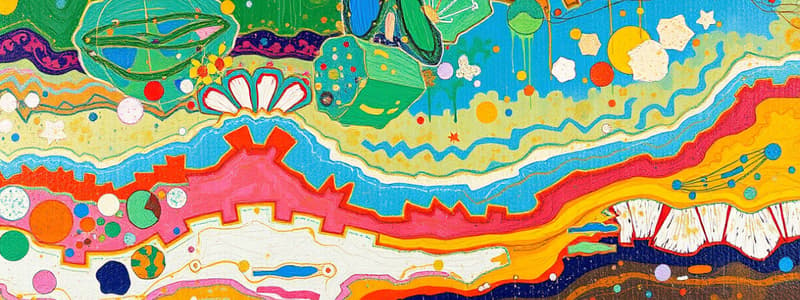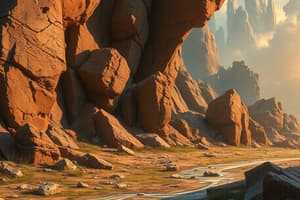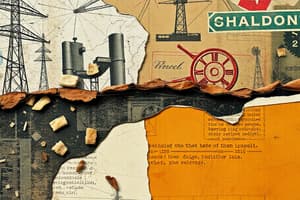Podcast
Questions and Answers
How do Earth materials weather?
How do Earth materials weather?
mechanical or chemical processes
Mechanical processes change the size of a substance but not its composition.
Mechanical processes change the size of a substance but not its composition.
True (A)
Chemical processes do not change the composition of materials.
Chemical processes do not change the composition of materials.
False (B)
Different types of weathering can work together on the same material.
Different types of weathering can work together on the same material.
Where does soil form?
Where does soil form?
Why is topsoil important?
Why is topsoil important?
What is weathering?
What is weathering?
Which of the following are types of mechanical weathering? (Select all that apply)
Which of the following are types of mechanical weathering? (Select all that apply)
What factors affect the rates of weathering?
What factors affect the rates of weathering?
What is erosion?
What is erosion?
What are the types of erosion? (Select all that apply)
What are the types of erosion? (Select all that apply)
What is deposition?
What is deposition?
What does mechanical weathering do?
What does mechanical weathering do?
What is ice wedging?
What is ice wedging?
What happens to rocks in abrasion?
What happens to rocks in abrasion?
What causes abrasion?
What causes abrasion?
What else can do the work of mechanical weathering?
What else can do the work of mechanical weathering?
What is chemical weathering?
What is chemical weathering?
What is oxidation?
What is oxidation?
How does water affect chemical weathering?
How does water affect chemical weathering?
What is chemical weathering by carbonic acid?
What is chemical weathering by carbonic acid?
Flashcards are hidden until you start studying
Study Notes
Weathering Processes
- Earth materials weather through mechanical or chemical processes, leading to breakdown and change.
- Mechanical processes alter the size of a substance without changing its composition, while chemical processes change its composition.
Types of Weathering
- Different types of weathering can operate on the same material simultaneously, indicating complex interactions.
Soil Formation
- Soil forms atop rock, influenced by environmental conditions specific to the region, determining its type.
Importance of Topsoil
- Good topsoil is crucial for crop growth, playing a significant role in agricultural productivity.
Definition of Weathering
- Weathering is the breakdown of rock into smaller pieces (sediments) through processes like chemical reactions, hydration, and biological action, as well as physical impacts and wedging (frost, plant roots, salt crystal growth).
Mechanical Weathering Types
- Frost wedging occurs from alternating freezing and thawing of water, causing expansion.
- Root wedging involves plant roots growing into fractures and joints in rocks.
- Abrasion results from rocks rubbing against each other, creating smooth surfaces.
- Exfoliation is the peeling away of large sheets of loosened rock material.
Weathering Rates
- Weathering rates increase with a decrease in particle size, exposing more surface area.
- Hard rocks weather slowly, while soft rocks weather quickly.
- Climate affects weathering rates, where precipitation and temperature play significant roles.
Erosion Defined
- Erosion is the process that transports sediments after they are separated from rocks, contributing to landscape changes.
Types of Erosion
- Wind erosion is prevalent in arid regions with minimal ground cover.
- Glacial erosion involves scraping and transporting debris, reshaping landscapes.
- Rill erosion results from heavy water runoff, particularly after rainfall.
- Gully erosion involves large soil removal due to intense rain.
Deposition Process
- Deposition occurs when sediments are dropped and settle, contributing to landscape formation.
Mechanical Weathering Explained
- Mechanical weathering (physical weathering) reduces rocks to smaller pieces without altering their mineral composition.
Ice Wedging
- Ice wedging is a primary mechanical weathering process in climates with frequent freezing and thawing cycles, breaking rocks apart efficiently.
Effects of Abrasion
- Abrasion smooths rocks with jagged edges, commonly observed in natural settings like beaches and rivers.
Causes of Abrasion
- Abrasion is driven by gravity, moving water, wind, and glaciers, which all facilitate collision and rounding of rocks.
Role of Living Organisms
- Plants and animals contribute to mechanical weathering, with roots expanding in cracks and burrowing creatures disrupting rock integrity.
- Human activities, like construction and mining, significantly increase mechanical weathering through physical disruption of landscapes.
Chemical Weathering Dynamics
- Chemical weathering alters rock composition through reactions that change minerals, often without affecting the size of the pieces.
Oxidation Process
- Oxidation involves oxygen reacting with elements (e.g., iron), leading to corrosion and rust formation, significantly impacting iron-rich minerals.
Water's Role in Chemical Weathering
- Water's polar nature allows it to dissolve minerals, separating ions from compounds, and can dissolve certain minerals entirely.
Carbonic Acid in Weathering
- Carbon dioxide combines with water to form carbonic acid, a powerful natural agent of weathering that dissolves rocks and minerals.
- Acid rain, formed from pollutants, significantly accelerates chemical weathering through sulfuric and nitric acids.
Studying That Suits You
Use AI to generate personalized quizzes and flashcards to suit your learning preferences.




